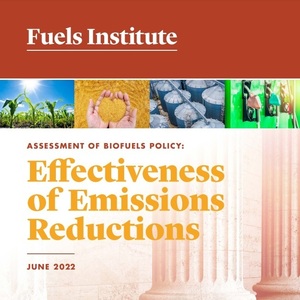Fuels Institute paper explores the carbon benefits of biofuels

June 22, 2022
BY Erin Voegele
The Fuels Institute in June published a new white paper that discusses the carbon benefits of various biofuels. The paper also addresses matters related to policy, feedstocks availability, and vehicle and infrastructure constraints.
The Fuels Institute is a nonprofit group founded by National Association of Convenience Stores in 2013 that aims to publish fact-based research related to market questions impacting the fuels sector. The new white paper, titled “Assessment of Biofuels Policy: effectiveness of Emissions Reductions,” addresses ethanol, biodiesel, renewable diesel, renewable gasoline, hydrogen, and fuel blends containing 80 percent renewable diesel and 20 percent biodiesel (R80B20).
“We all know that the road to decarbonization is a long one, and despite the introduction of new vehicle technologies that promise to dramatically reduce carbon emissions, the reality is that we are going to be driving combustion engines and burning liquid fuels for decades, and we must pay careful attention to this sector of the market,” said John Eichberger, Fuels Institute executive director. “The paper is just the tip of the iceberg. We hope it jump-starts the conversation about finding an answer to carbon emissions from all vehicles, not just new vehicles equipped with different technology.”
Advertisement
One section of the paper discuses the various methods used to calculate a fuel’s life cycle analysis (LCA) and explains how LCA outcomes can differ significantly depending on the methodological model used and methodological choices made by researchers, such as the treatment of indirect land use change (ILUC). To help the reader understand the impact of these variables, the paper includes visual comparisons of the resulting carbon intensity (CI) scores for various biofuels modeled using different models and methodologies required by foreign and domestic policies. For example, the CI of palm oil biodiesel under the California Low Carbon Fuel Standard is significantly higher than the CI of petroleum diesel. Under German policy, however, the CI of palm oil biodiesel is roughly one-fifth the CI of petroleum diesel. The paper also provides a timeline for CI modeling of corn ethanol that shows how process improvements and improved modeling techniques have impacted the CI of the resulting fuel. For example, the paper show that modeling completed by Argonne National Lab in 1990 calculated the CI of corn ethanol at just under 100 gCO2e/MJ. Thirty year later, in 2020, ANL’s calculations put the CI of corn ethanol at roughly 50 gCO2e/MJ.
The white paper also includes a discussion of the federal RFS programs, as well as low carbon fuel programs that have been implemented in California and Oregon. In addition, the Fuels Institute discusses the impact of other potential and existing policies, including legislative efforts to implement a high-octane standard, the U.S. EPA’s expected actions to reduce emissions from heavy-duty trucks, the blenders tax credit for biodiesel and renewable diesel, and the 45Q tax credit for carbon capture and storage (CCS) that will benefit planned CCS projects at numerous ethanol plants.
Advertisement
Finally, the white paper includes a discussion of biofuel feedstock availability and demand. While projections included in the paper show relatively minor changes expected for biodiesel and ethanol feedstocks through 2030, feedstock demand for renewable diesel production is expected to grow significantly, from roughly 2 million metric tons in 2020 to more than 6 million metric tons in 2030.
Despite a federal policy push towards electric cars, the Fuels Institute projects little change in the number of gasoline-fueled light-duty cars in the U.S. fleet through 2030. The white paper estimates that 76.8 percent of light duty cars in the U.S. fleet will be gasoline in 2030, with 5.2 percent ethanol flex-fuel, 2.5 percent diesel, 5.1 percent hybrid gasoline, 1.4 percent plug-in hybrid EV gasoline, and 8.8 percent electric vehicles.
A full copy of the white paper can be downloaded from the Fuels Institute website.
Related Stories
The USDA on April 14 announced the cancellation of its Partnerships for Climate-Smart Commodities program. Select projects that meet certain requirements may continue under a new Advancing Markets for Producers initiative.
The governors of Iowa, Nebraska, South Dakota and Missouri on April 10 sent a letter to U.S. EPA Administrator Lee Zeldin urging the agency to set higher Renewable Fuel Standard renewable volume obligations (RVOs).
President Donald Trump on April 8 issued an executive order that aims to protect oil, natural gas, coal, hydropower, geothermal, biofuel, critical mineral, and nuclear energy resources from state overreach.
Growth Energy, Clean Fuels respond to oil industry in case pushing EPA to reallocate lost biofuel gallons
Growth Energy and Clean Fuels Alliance America on April 14 filed a reply brief in a case challenging the U.S. EPA for its failure to reallocate gallons lost due to SREs granted after RVOs have been issued under the Renewable Fuel Standard.
The Michigan Advanced Biofuels Coalition and Green Marine are partnering to accelerating adoption of sustainable biofuels to improve air quality and reduce GHG emissions in Michigan and across the Great Lakes and St. Lawrence Seaway.
Upcoming Events










